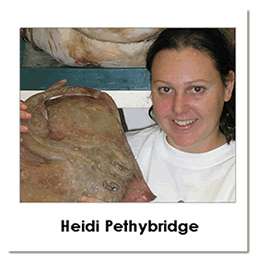
| Home > The Scientists > Heidi Pethybridge | |||||||||||||||
Heidi’s favourite subjects at school were biology and chemistry, and she knew from an early age that she wanted to have a career in science. “Science is exciting and always moving forward, with new discoveries being made everyday, and being a part of answering unanswered questions is very exciting and rewarding.” Heidi’s current PhD work on the trophic ecology of deep-sea sharks from the waters of Tasmania and sub-Antarctica will be useful for achieving ecologically sustainable management of fisheries and species conservation. “Currently there is a serious problem of overfishing of deep-sea marine animals with very little known or understood about them and their position in the marine ecosystem. Heidi says it is satisfying to know that her findings will be able to assist managers that may ultimately protect a threatened species or an entire ecological community. “The research I’m doing will help protect species by supplying scientifically based information, allowing the effects of fishing on the wider ecosystem to be considered in management decisions.” Find out more about Heidi's Project Key words: Antarctica, trophic ecology, deep-sea sharks, marine biology, zoology, threatened species, ecosystem, overfishing, conservation. Heidi is investigating the trophic ecology of deep-sea sharks from waters of Tasmania and sub-Antarctica. She is using innovative biochemical techniques to determine what and how much several shark (dogfish) species are eating, how mercury and other toxic metals bio-accumulate in their body, metabolic activity (using enzyme analysis), and how much energy the sharks invest for the development of their pups.
Her project will also help us to understand the tropho-dynamics of the marine community in Tasmanian and sub-Antarctic waters, and hence will be useful for achieving ecologically sustainable management of fisheries and species conservation. “Research such as this is vital to help protect species and communities by supplying the scientifically based information that is required to make crucial management decisions in considering the wider ecosystem/community affects of fishing. My project is interesting as it is applying techniques that have never been applied to shark biology and ecology to answer questions that are currently unanswered.” Useful Websites: For more information and great ideas for classroom activities, visit:
|
|||||||||||||||

